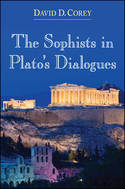The sophists in Plato's dialogues
- ISBN: 9781438456188
- Editorial: State University of New York Press
- Fecha de la edición: 2016
- Lugar de la edición: New York. Estados Unidos de Norteamérica
- Encuadernación: Rústica
- Medidas: 24 cm
- Nº Pág.: 328
- Idiomas: Inglés

Are the sophists merely another group of villains in Plato’s dialogues, no different than amoral rhetoricians such as Thrasymachus, Callicles, and Polus? Building on a wave of recent interest in the Greek sophists, The Sophists in Plato’s Dialogues argues that, contrary to the conventional wisdom, there exist important affinities between Socrates and the sophists he engages in conversation. Both focused squarely on aret? (virtue or excellence). Both employed rhetorical techniques of refutation, revisionary myth construction, esotericism, and irony. Both engaged in similar ways of minimizing the potential friction that sometimes arises between intellectuals and the city. Perhaps the most important affinity between Socrates and the sophists, David D. Corey argues, was their mutual recognition of a basic epistemological insight—that appearances (phainomena) both physical and intellectual were vexingly unstable. Such things as justice, beauty, piety, and nobility are susceptible to radical change depending upon the angle from which they are viewed. Socrates uses the sophists and sometimes plays the role of sophist himself in order to awaken interlocutors and readers from their dogmatic slumber. This in turn generates wonder (thaumas), which, according to Socrates, is nothing other than the beginning of philosophy.







